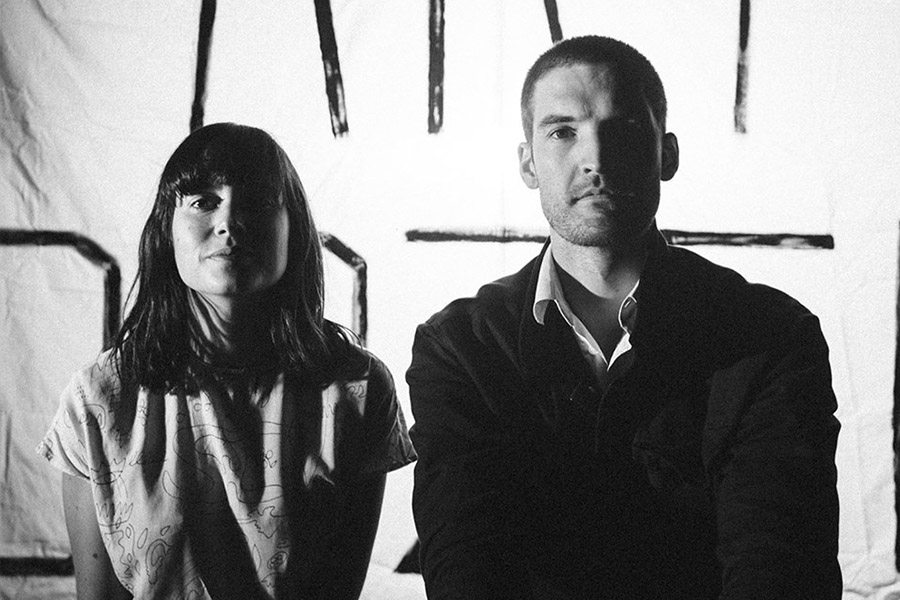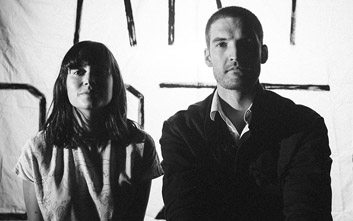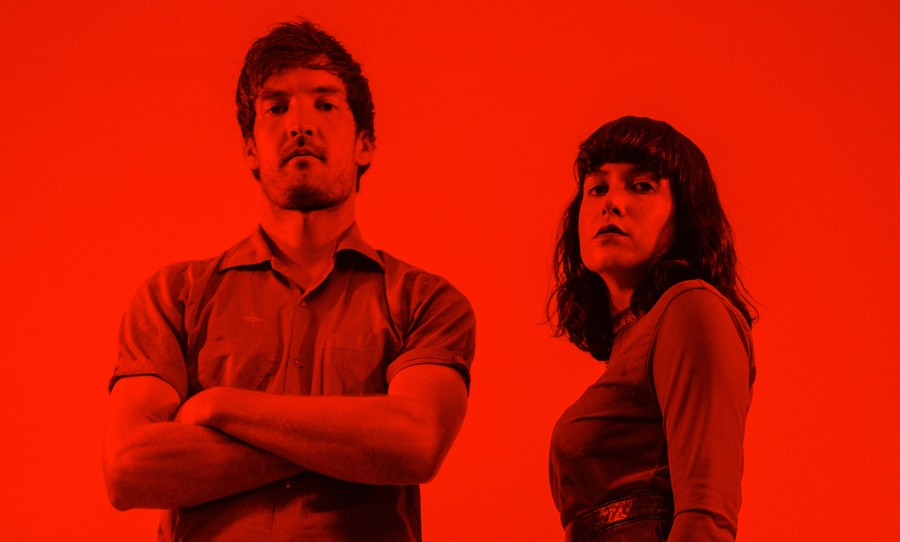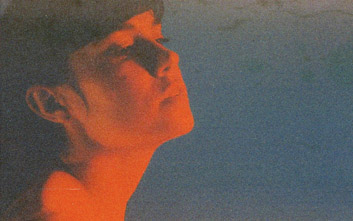Music’s history is littered with improvisational outfits which have worked their way toward the centre of pop, yet Sydney duo Party Dozen are a slight inverse. Percussionist Jonathan Boulet and saxophonist Kirsty Tickle both share pop-leaning backgrounds; John with his solo work and Kirsty with indie outfit Little Scout plus her current project Exhibitionist. Pairing while living away from home in Berlin, the duo set to work crafting what began as loud and unruly collaborations into a surprisingly engaging sound.
Returning to Australia, the two have continued to push onward. Intent on throwing the rule book out the window, long-player The Living Man refines their loop based and improvisational jams into a potent body of work. Tracks like the throbbing Straights and primal Satisfaction showcase dissonant and abrasive sonics.
Perhaps that’s the true magic of this outfit; Party Dozen create a rare music which can connect without comprising its capacity to surprise.

Party Dozen’s debut record is littered with more than a few moments of instantly catchy but abrasive noise. Yet, there’s also something magnetic about it.
HAPPY: I’ve had a chat to two other groups today, Body Type and Spirit Bunny. Both really love your band. I think Cameron Smith from Spirit Bunny even worked with you at some point?
JOHNATHAN: Oh cool!
KIRSTY: Yeah! With Little Scout actually. Back in the day, Cam recorded the very first Little Scout EP and we’ve played with Spirit Bunny in Sydney as well.
HAPPY: You’re an improvisational outfit which is pretty brassy given that live audiences aren’t always receptive to music which falls outside of musical tropes or clichés. How do you find it when you perform?
JOHNATHAN: I think it’s nice to hear the different perspectives. People come at you with really weird and obscure groups that you remind them of. It’s always really varied stuff.
HAPPY: What’s one of the weirdest comparisons that they’ve thrown at you?
KIRSTY: Not a comparison, but one of our friend’s sisters saw us play and after said she was almost moved to tears because she felt it was so beautiful. For me personally, Party Dozen is very abrasive! Beautiful is not the word I would use to describe it, but beautiful was what she took from it. She took it as this really cinematic, gorgeous sound. That one blew me away a little bit.
JOHNATHAN: There’s been some nice comparisons and some not so nice ones. Some people have been like, “Oh, it’s like Death Grips!” We love Death Grips so that’s really nice. Other people have said things like, “Ah, it reminds me of early The Prodigy.” Which is okay I guess! If you’re into that kind of stuff that’s cool.
KIRSTY: I guess that’s just the energy though isn’t it? It’s like fast, upbeat. Not all of our music is fast, more the energy of the whole project maybe.
JOHNATHAN: It seems like people grab onto very different things. Not just the sounds.
HAPPY: Is it a wholly unstructured music? What sort of parameters do you set yourself when performing?
JOHNATHAN: The whole thing is based off the sampled loops that we’ve got. I’ve got loops that I can trigger on and off. Basically, that’s the blueprint for the jam. I’ll start with Loop A we’ll jam on that and I’ll change it if we want to switch to another section. It’s quite simple, the structures are usually very much AB, a very simple structure. We just jump on top of it and try to make it interesting.
HAPPY: I would find going into that live environment very intimidating. I’ve done jams before an audience before and sometimes you’re doing something which you think sounds really cool but someone is just there giving you that look! How do you guys manage that sort of thing?
JOHNATHAN: I don’t really look up much!
KIRSTY: I’ve actually started looking up a lot more because I spend a lot of time staring at my pedals or just looking at Johnno. Last night I made a conscious effort to look directly at the audience while we were playing two or three songs. I think it’s really rewarding when you do because people engage with you a lot more. We’ve both done a lot of other music things in the past and I think these are our instruments that we’re best at so we feel really comfortable. It’s not scary and because it’s not a beautiful jazzy kind of instrumentation, if I fuck up it’s okay.
JOHNATHAN: It’s not very subtle. It’s like, “how much shit can we throw against the wall?!”
KIRSTY: And sometimes we go about it just being about how much fucked up noise can we make, but then we’ll pull it back and play something much more melodic.
HAPPY: What elements of your sound which you’ve created live or through jams did you bring forward with your recordings?
JOHNATHAN: The recording part is where most the improv happens. We’ll put it down to tape and we’ll jam and improve a couple of times and pick the best take or trim it down or something like that.
HAPPY: Is that a labour-intensive process? Were you going through a lot of material?
JOHNATHAN: Not really. We were doing it very occasionally, putting a song out every couple of months which helped make every song a little different. We weren’t just repeating the same ideas every time. After you do that you kind of have a structure in front of you that you get used to and then we get to elaborate on.
HAPPY: You were living in Berlin at the time you came together. Can you tell me a little more about that?
KIRSTY: We both moved over there because we liked the city and we wanted to get out of Australia for a little while. I think it was definitely a grass is greener scenario for us musically. I think we thought that Australia was a bit behind musically, which we now don’t feel the same way about as we did when we moved to Berlin. But at the time Johnno was still doing his Jonathon Boulet stuff, having just recorded his third album and I had gotten a grant to basically write music, arrange and that kind of thing.
We were both in the same city and we basically started off jokingly playing each other’s instruments. It was me on drums and Johnno on saxophone – it sounded really shit and then we changed back. Initially, I really pushed against it, I thought it sounded horrible because I didn’t know how to use guitar pedals and I had a really shitty microphone. It sounded pretty abrasive and pretty gross…
JOHNATHAN: It was hard to control at first.
KIRSTY: : That’s a better way to put it, and the mouthing was also really hard to control. I’ve played woodwind instruments for a long time, but it was really difficult for me to control playing really hard but not overblowing every single note. It was a big learning curve, but we kept on jamming and I started to really enjoy it. It was just us expressing the music that we like.
HAPPY: Your music has some great drone and noise elements. Are there any acts you would say have informed creatively? What gave you that confidence to start making some out there music and then bring it in closer to mainstream ears?
JOHNATHAN: I think both having pop backgrounds we still want things to be catchy. We still want people to grab onto it and associate with it. I think that really came through, you want it to be instantly accessible in the most inaccessible way.
KIRSTY: Even though there are still drones, there are melodies that we’ve thought about or the loop might be a really good guitar hook. That’s where the pop sensibilities shine I think.
JOHNATHAN: I guess the repetitiveness of those loops makes it stick in your mind.
HAPPY: I think it’s great that you’re pushing your music out via community radio and even triple j Unearthed. Bringing some new ideas into the world of popular music or a bigger audience something which motivates you as a group?
JOHNATHAN: I don’t know. I feel like most of that stuff is really just situational. Again, we’re from pop backgrounds and indie bands. There’s not a lot of avenues in Australia where you can showcase your music so that’s where we’ve gone. For us, it was like we’ll do as much as we can, because the wider you reach the more people will hear it.
KIRSTY: I think, particularly with triple j Unearthed, people are very quick to be like, “I don’t want to be under that banner.” Especially in our world of music that Part Dozen lives in. Tommy Faith, who is the producer of triple j Unearthed now, he really championed Party Dozen from the beginning. Even before he had that job he was doing it through the blog that he ran. When he got to Unearthed he asked if I was going to put that up. I hadn’t really thought of it, but the track even got played on triple j’s Home and Hosed.
I think any support you can get, you shouldn’t close off any doors because people are just people. Everyone has a target market – that’s okay! That’s an alright thing, but the thing about triple j Unearthed that people probably don’t realise is that every single track that gets uploaded gets listened to. Someone puts their time and effort into listening to your song.
Even if they don’t like it that’s okay, because at least you’re getting some good feedback or some kind of constructive criticism like maybe it’s a good song but the recording’s not good. What do you do then? You can save up a bit of cash so you can get it mixed properly next time. I think it’s a really valuable thing to have in Australia which other countries don’t have. We’re really fortunate to have it.
HAPPY: Creatively is there anyone person or act that would consider a key influence?
JOHNATHAN: I think there’s a lot of those people. Just general inspirational artists that you see around. We’ve been very lucky, there’s been a lot of support – unexpected support. I don’t know, people are sort of open to this stuff for some reason, which is nice!
KIRSTY: I think we’re lucky as well in Sydney, we have a really wonderful community in our close group of friends. Everyone plays in each other’s bands and everyone helps each other out. The DIY scene before Black Wire Records closed, that was where we started playing.
HAPPY: It’s terrible the way it had to shut down.
KIRSTY: But one door closes and another opens. It was just a space and the community is still there. I think we all rally behind each other and that to me is inspiring, more so than the pop thing.
JOHNATHAN: That’s worth being a part of, for sure.



